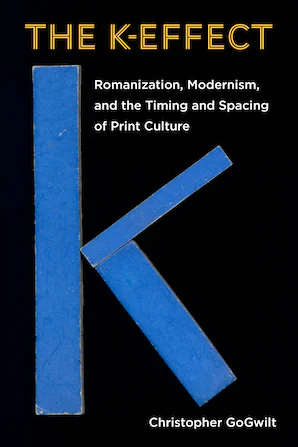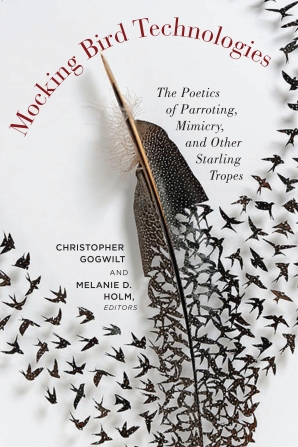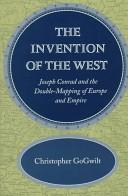Books
- The K-Effect: Romanization, Modernism, and the Timing and Spacing of Print Culture (Fordham University Press, 2023)

The K-Effect shows how the roman alphabet has functioned as a standardizing global model for modern print culture. Investigating the history and ongoing effects of romanization, GoGwilt reads modernism in a global and comparative perspective, through the works of Joseph Conrad and others. The book explores the ambiguous effect of romanized transliteration both in the service of colonization and as an instrument of decolonization. This simultaneously standardizing and destabilizing effect is abbreviated in the way the letter K indexes changing hierarchies in the relation between languages and scripts. The book traces this K-effect through the linguistic work of transliteration and its aesthetic organization in transnational modernism. The book examines a variety of different cases of romanization: the historical shift from Arabic script to romanized print form in writing Malay; the politicization of language and script reforms across Russia and Central Europe; the role of Chinese debates about romanization in shaping global transformations in print media; and the place of romanization between ancient Sanskrit models of language and script and contemporary digital forms of coding. Each case study develops an analysis of Conrad's fiction read in comparison with such other writers as James Joyce, Lu Xun, Franz Kafka, and Pramoedya Ananta Toer. The first sustained cultural study of romanization, The K-Effect proposes an important new way to assess the multi-lingual and multi-script coordinates of modern print culture
Reviews:
"In an exhilarating exploration of the letter K and other micro-textual details across a range of writing systems, GoGwilt reexamines the history of romanization and its entanglement with Arabic, Chinese, and other major scripts. A fascinating range of modernist texts converge to form a powerful archive of exile, encounter, conflict, and transformative shifts in modern global history. A bold experiment in comparative method --Lydia H. Liu, author of The Freudian Robot: Digital Media and the Future of the Unconscious
"No one has every drawn, from the history of romanization and the shifting norms of transliteration, such subtle insights into the linguistic, social, and aesthetic forms of modernity as Christopher GoGwilt, and across so vast a world of scripts and languages. He has given us a truly innovative, eye-opening book" --Sheldon Pollock, Columbia University
- Westernness: Critical Relections on the Spatio-Temporal Construction of the West (De Gruyter, 2022)

Coedited with Holt Meyer and Sergey Sistiaga
The word 'West' is omnipresent and often unquestioned. The goal of this volume is to elaborate critical reflections on this concept. The articles focus on spatio-temporal practices in the production and representation of westernness.
- Mocking Bird Technologies: The Poetics of Parroting, Mimicry, and Other Starling Tropes (Fordham University Press, 2018)

Coedited with Melanie D. Holm
This volume brings together a range of perspectives to offer an extended meditation on bird mimicry in literature: the way birds mimic humans, the way humans mimic birds, and the way mimicry of any kind involves technologies that extend across as well as beyond language and species. The essays examine the historical, poetic, and semiotic problem of mimesis exemplified both by the imitative behavior of parrots, starlings, and other mocking birds and by the poetic trope of such birds in a range of literary and philological traditions.
Reviews:
"When we accuse someone of 'parroting,' we relegate bird mimicry to the margins; but what about the human mimicry of parrots, starlings, and other 'mocking birds'? This collection explores transspecies communication and imitation in terms of language, rhythm, and style. It is a signal contribution to animal studies, lyric theory, and the question of language(s). It also provides a wonderful de-centering of humans in the making of song and sense." --Elaine Freedgood, New York University
"The book is ambitious in its theoretical intent, charming in its execution, and innovative in its methodology, proposing a less human-centered literary, cultural, and linguistic criticism ... a wonderfully innovative collection that breaks open long-held conceptual barriers between critical and creative, and between animal and human, and in so doing creates new and liberating realms of critical and creative possibility. " --Katherine Playfair Quinsey, Modern Philology
- The Passage of Literature: Genealogies of Modernism in Conrad, Rhys, and Pramoedya (Oxford University Press, 2011)

Winner of the Modernist Studies Association Book Prize for 2012.
Through a set of comparative studies of the fiction of Joseph Conrad, Jean Rhys, and Pramoedya Ananta Toer, this book explains the interrelation between English, Creole, and Indonesian formations of literary modernism. The book argues that each passage of literature is the site of contest between competing genealogies of modernism and modernity.
Reviews:
"Reading three diverse modernisms--English, Creole, and Indonesian--in close conversation with one another, Christopher GoGwilt confronts the limits of predominantly Anglophone approaches to modernism. In the process, he redefines key concepts in postcolonial and modernist studies, productively extends recent debates concerning world literature, and offers a model for reconfiguring temporal and geographical relationships in global modernist studies." --Mary Lou Emery, author of Modernism, the Visual, and Caribbean Literature
"This is an illuminating comparative study of different genealogies of the modernist novel across continents and periods in the twentieth and early twenty-first century. The book's chapters on Pramoedya Ananta Toer's fascinating body of work add a genuinely non-Anglophone transnational dimension to the study of literary modernism, particularly in their provocative call for a theoretically informed postcolonial philology." --Pheng Cheah, author of Spectral Nationality: Passages of Freedom from Kant to Postcolonial Literatures of Liberation
"[A] brilliant comparative study of the interrelated genealogies of English, Creole, and Indonesian modernisms...GoGwilt reinvigorates postcolonial studies by returning it to close textual analysis. His valuable book will surely generate much research. Highly recommended." --Choice
"GoGwilt's practice of postcolonial philology offers modernist studies a rich theoretical approach through which to intimately connect, rather than merely multiply, transnational modernist movements. More importantly, he demonstrates how such readings can do ample justice to the historical and material interrelations of these modernisms." --Modern Fiction Studies
- The Fiction of Geopolitics: Afterimages of Culture from Wilkie Collins to Alfred Hitchcock (Stanford University Press, 2000)

Studying a range of writers, genres, and disciplines, this book interrogates the status of geopolitics as a powerful twentieth-century fiction. Charting the contours of the long turn of the century, from 1860 to 1940, the book moves back and forth from Victorian to modernist fields of study to show how the nineteenth-century European hypothesis of culture haunts the twentieth-century fiction of geopolitics. Individual chapters offer readings of anarchist and imperialist geographers, Wilkie Collins and the formalization of the British Empire, Olive Schreiner and Friedrich Nietzsche, R. B. Cunninghame Graham's sketch-artistry, and the moment of transatlantic crossover in Alfred Hitchcock's films.
Reviews:
"The Fiction of Geopolitics is a wide-ranging book ... moving back and forth not only from Victorian to modernist fields of study, but also from philosophers and geographers to writers of fiction and visual artists. ... [I]t is a liberating achievement ... clearly a significant contribution to comparative studies of literature, culture, and theory." --Jakob Lothe (University of Oslo, author of Narrative in Fiction and Film), ANQ
The arc of GoGwilt's analysis ... carries him from the Victorian novelist Collins to the early Hitchcock .... balanc[ing] [a] persuasive genealogical argument with illuminating analyses of individual writers and texts. ... While these specific readings demonstrate GoGwilt's interdisciplinary rigor and perspicacity, the real originality and significance of his study rests on his subtle, nuanced understanding of literary and cinematic form." --Nico Israel (Hunter College, author of Outlandish: Writing Between Exile and Diaspora) in Modernism/modernity.
- The Invention of the West: Joseph Conrad and the Double-Mapping of Europe and Empire (Stanford University Press, 1995)

By placing Joseph Conrad's fiction at the center of an examination of the term "the West," this study reconceives the major contours of Conrad's work to show how the contemporary commonplace idea of the West emerged around the turn of the century from the combined and related phenomena of European imperial expansion and a crisis of democratic politics. The author argues that twentieth-century ideas of the West can be traced to the convergence of two distinct discursive contexts: the "new imperialism" of the 1890's that gave wider currency to oppositions between East and West, and the influence of nineteenth-century Russian debates on Western European ideas of Europe. The work of Conrad is shown to be uniquely suited to studying the relation between these two cultural and political contexts, since they provided Conrad with his two great themes - colonialism and revolution.
Reviews:
"GoGwilt's study revises and clarifies our understanding of the imaginative geography of empire. It casts important light on a late-Victorian moment of ideological remapping. But it also makes an indispensable contribution to our understanding of the discursive order of our own historical moment." --John A. McClure (Rutgers University, author of Partial Faiths: Postsecular Fiction in the Age of Pynchon and Morrison), in Victorian Studies.
"lucid and readable, a work of accomplished scholarship..." --Choice
"GoGwilt's important post-colonial study ... combines subtle readings of Conrad with a powerful historiographical argument, which develops and complements Edward Said's critique of Orientalism" --Max Saunders (King's College, London, author of Ford Madox Ford: A Dual Life and Self Impression: Life-Writing, Autobiografiction, and the Forms of Modern Literature), in the Times Literary Supplement.
"GoGwilt's claims provide ... a superb set of terms and emphases for reading Conrad, enabling us to see the novels of intra-European politics ... as engaged with essentially the same discursive or ideological material as those of colonial adventure." --James F. English (University of Pennsylvania, author of The Economy of Prestige: Prizes, Awards, and the Circulation of Cultural Value) in Modern Philology